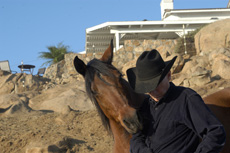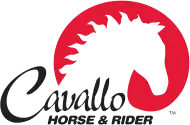Cavallo’s Friend – Joe Camp

One of Cavallo’s favourite people is Joe Camp. You may know him as the author of the book and movie Benji; or more recently for The Soul of a Horse and The Soul of a Horse Blogged – The Journey Continues. We are so happy to be able to feature his writing on Cavallo’s blog.
Choices
I had to smile watching Cash last evening. I was just sitting in the Gator way up the hill gawking at the herd after distributing half a bale of Bermuda hay in the western pasture. We still do this even in the Spring and Summer to help ensure maximum movement for the horses and to give them a way to balance the high sugars of the cool season grasses now popping up until the creeping tentacles of the Bermuda (warm season grass, low sugar) begin to come alive. It’s always interesting to me that even with all the sweet Spring grasses around – and clover, oh my gosh clover is everywhere! – they still usually race to the hay when I put it out. I had a foot propped up on the dash of the Gator, just taking it all in, hoping perhaps for a fecal sample from Noelle, when I heard something behind me. It was Cash, very close, nibbling away at blades of grass, not hay. I dialed in the focus to see if he was eating the same grass each bite or having himself a varied diet. When we moved from southern California we were warned by many that horses could not be out 24/7 on the rich grasses of middle Tennessee. That made no sense to me so I started researching. Went straight away to wild horses for my lessons. I discovered that the pasture the horse needs isn’t pretty. Not what you’d expect to see driving through Kentucky, or even our little slice of middle Tennessee. So our pasture is ugly with a capital “U”. Seven or eight different kinds of native grasses (none genetically modified), lots of weeds, berries, brambles, bushes, and trees of all kinds. Choices. Lots of them. Most of the pastures around here are thick carpets of a single type of cool season grass (high sugar) without a weed or a tree, chemically fertilized and sprayed for pests and weeds. All bad for the horse. If you give a horse no choice, he’ll eat whatever’s there to stay alive. Give him all the choices he needs and he’ll take better care of himself than we humans can.

Cash was using his nose, lips, and even his tongue to distinguish one blade from another. It was fascinating to watch. He was very picky and mowing almost faster than I could watch. The way he was using his tongue was so intriguing it was difficult to focus on which blade of grass was disappearing. But focus I did and was pleased that he was rejecting the clover. How many times had I been told to keep clover out of a pasture at all costs? Too much sugar! Cash would take a bit of fescue, a bite of orchard, balance it with some (warm season, low sugar) Johnson grass, an undistinguished weed here and there, but never a bite of clover. Not one. Once he even nuzzled into a big patch of clover and I thought Aha! But he was only after a couple of blades of grass hidden right square in the middle of the clover. Not one shamrock passed between his teeth. Then he met up with the long string of hay stretching out toward the west and settled in with the others making pilgrimage toward the setting sun.
I couldn’t help the smile stretching across my face. Choices, I thought. The wild horses had assured me that if I give them all the choices they need or want they will take care of themselves. A horse’s genetics know what the horse needs and when. If a horse needs a liver cleansing the brain will send him after thistle. When he needs vitamin E it might send him searching for a blackberry etc. If he’s eaten quite enough of high-sugar grasses, he’ll switch to the low sugar grasses to balance. When humans attempt to perform these functions, it’s usually pure guesswork, and usually late, behind the curve.
I knew all this from the research but I must admit it was quite exhilarating to see it in play right in front of my eyes. I just sat there watching these magnificent creatures until the sun finally disappeared behind the hill, feeling very good about the choices we made so our herd would have the choices they needed.
Joe and Kathleen’s herd is coming up on their second anniversary of being out 24/7 in middle Tennessee. For more on this subject read Joe’s The Soul of a Horse Blogged – The Journey Continues or visit www.thesoulofahorse.com

